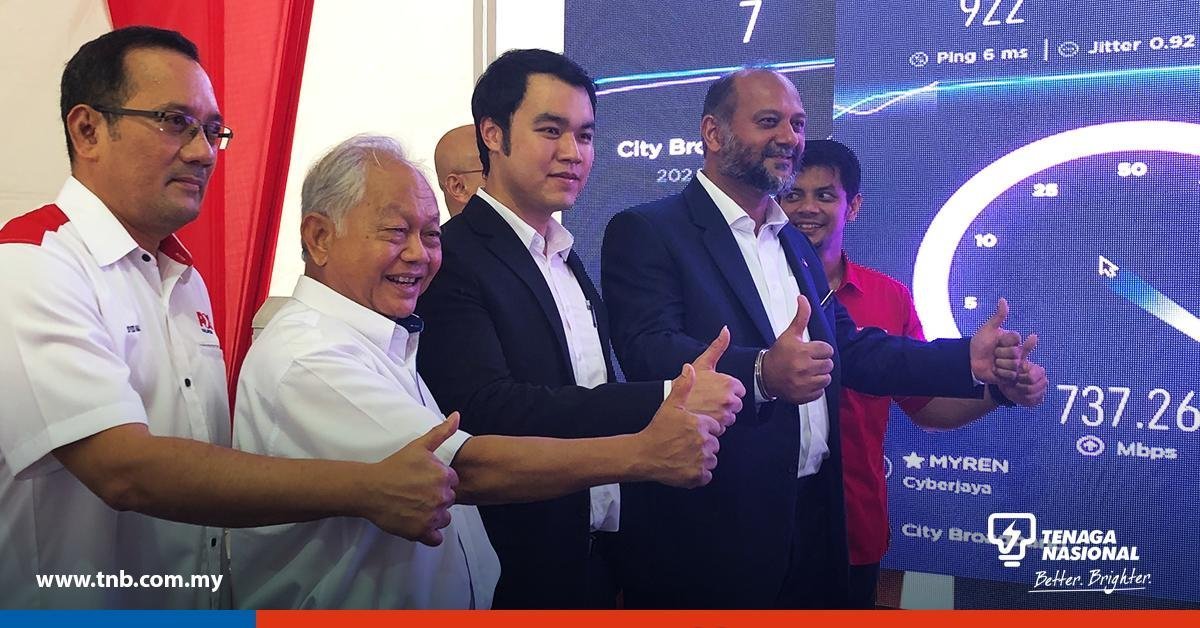This is a commentary.
Is the Malaysian Government repeating the same mistake it did with Telekom Malaysia?
In 2008, the national High-Speed Broadband (HSBB) initiative was implemented by a single Internet service provider (ISP), Telekom Malaysia (TM) and the Malaysian Government. For HSBB 1, the Malaysian Government invested RM2.4 billion and TM RM8.9 billion to provide high-speed broadband access to over 1.3 million premises by 2012.
Despite this was a “national initiative”, all other major Telecommunication players were not involved in the project, including Maxis, Celcom Axiata, Digi and TIME dotCom.
The project even continued with HSBB 2 and the cost reportedly be RM1.8 billion, with the government contributing RM500 million of that and TM responsible for the remainder.
Its a lot of tax payer money but in the end of the day, even the Malaysian Government appears to have little control over HSBB and have had a hard time bringing down Unifi’s broadband pricing.
Note: Unifi is a product of Telekom Malaysia and it rides on the HSBB network to offer fibre broadband services.
HSBB is not entirely a failed project, as it is currently being enjoyed by over 1 million Malaysians (out of more than 30 million Internet users out there). These benefits include free upgraded speeds up to 800Mbps (exclusive to Unifi at this point), improving our broadband ranking globally, etc.
The problem with HSBB, in my opinion:
- Telekom Malaysia is the only ISP involved in the project, this can’t be called a National Initiative. No cooperation from the other ISPs.
- Telekom Malaysia controls the HSBB network, entirely. For example, it sells fibre access to Maxis and at the same time competes with Maxis via Unifi. This isn’t fair at all. Right now, Unifi 30Mbps is the cheapest fibre service at RM79/month, while Maxis Fibre 30Mbps cost RM89/month. Will Maxis ever be able to beat Unifi’s pricing? TM will probably never allow that because it controls pricing of HSBB. It was estimated that Maxis has to pay RM88.50 to TM for each 30Mbps subscription. Maxis itself have said that its been difficult and costly working with Telekom Malaysia.
- HSBB coverage are poorly deployed. There are no more ports available in areas where Unifi/Maxis fibre claims to have coverage and because of this, customers within coverage areas can’t sign up.
- Malaysian Government appears to have little control over HSBB, such as pricing, coverage and port availability. Billions of tax payer money was wasted?
- At the moment, Unifi (Telekom Malaysia) is able to offer up to 800Mbps speeds to consumers while Maxis fibre customers on the same HSBB network are stuck at 100Mbps because Maxis is unable to reach an agreement with TM over the past 6-months and counting.
And during all these period, TM maintains that it is not a monopoly and said that any ISPs could go out there build their own network. At the moment, some 80%-90% fixed broadband customers are either on Streamyx or Unifi.
The truth is, ISPs in Malaysia have tried to build their own fibre network out there, but there are many challenges, such as approvals from state Government/local councils/cooperation with utilities provider such as Tenaga Nasional… and financially its costly.
In October 2018, TIME dotCom said, “Many of you (Malaysians) have asked why we don’t cover landed properties. Let’s be clear: It’s not because we don’t want to. We simply can’t get approval to plant new poles, or get access to existing poles to serve landed neighborhoods. We’re sorry that we can’t reach you yet; and know that we will not stop trying.”
Here’s a troubling Fact- These are the top 5 shareholders of Telekom Malaysia and they are all linked to the Malaysian Goverment:
- Khazanah Nasional Berhad (the sovereign wealth fund of the Government of Malaysia): 26.21%
- Employees Provident Fund Board (federal statutory body under the purview of the Ministry of Finance): 15.2%
- Amanah Saham Bumiputera (Malaysian government-linked investment company): 11.84%
- Kumpulan Wang Persaraan (Malaysia government-linked company): 3.95%
- Amanah Saham Malaysia 2-Wawasan (under Permodalan Nasional Berhad (PNB), Malaysia government-linked company): 2.46%
Yet, we still can’t enjoy cheap broadband services from Telekom Malaysia in this country.
Double speed at half of the price- How long this is going to take?
Tenaga Nasiona Berhad

Due to the “challenges faced with Telekom Malaysia” and to lower broadband pricing, the Government decided to work closely with Tenaga Nasional Berhad (TNB).
Dubbed, National Fiberisation and Connectivity Plan (NFCP), the pilot project involved high-speed internet access of up to 1Gbps at 1,100 homes in Jasin, Melaka.
The problem is, TNB is not just a pure infrastructure player here.
Just like Telekom Malaysia, Tenaga Nasional Berhad (TNB) is selling fibre access to other ISPs and at the same time, it also competes with those ISPs for end consumers.
Here’s an example of the consumer broadband plans offered by the ISPs using TNB’s fibre network in Jasin, Melaka.
- City Broadband (Setia Haruman Technology (SHTech)): 50Mbps at RM79/month (100Mbps at RM99/month)
- Astro Broadband: 50Mbps at RM99/month
- Digi Broadband: 50Mbps at RM95/month
For those who don’t know, Setia Haruman Technology (SHTech) is a subsidiary of Tenaga Nasional Berhad. It acquired the company for RM28mil about 1 year ago.
Obviously, City Broadband which is a product of Setia Haruman Technology (SHTech) is able to offer the broadband service at the cheapest price.
So why is the Government repeating the same mistake with Telekom Malaysia?
Top 5 Shareholders of Tenaga Nasional Berhad (do you see a similarity with TM?):
- Khazanah Nasional Berhad: 28.76%
- Employees Provident Fund Board: 11.11%
- Amanah Saham Bumiputera: 9.03%
- Kumpulan Wang Persaraan (Diperbadankan): 4.81%
- Permodalan Nasional Berhad: 2.73%
Here’s How TNB-National Fiberisation and Connectivity Plan (NFCP) should be:
In my opinion, Tenaga Nasional will have to pick between becoming a pure infrastructure player or it could be part of a consortium where ISPs such as TIME dotCom, Maxis, Celcom, Digi and U Mobile are partners.
Pure Infrastructure Player: TNB will invest, build, expand and maintain its fibre network nationwide. It will sell fibre access to other ISPs such as TIME dotCom, Maxis, Celcom, Digi and U Mobile. It will not sell any product or services directly to consumers.
Consortium: TNB and the Malaysia Government will lead a national consortium of ISPs that includes TIME dotCom, Maxis, Celcom, Digi and U Mobile. All ISPs including TNB will contribute and play a role to build, expand and maintain the fibre network. All partners will enjoy an equal or an agreed pricing to access the TNB fiber network and these agreement must be transparent among the partners. TNB could continue to sell broadband services directly to consumers via City Broadband.
Unless either one of the two option above selected, we a just seeing another “Telekom Malaysia” in the market.
If you are reading this, please share this on Twitter and tag Communications and Multimedia Minister Gobind Singh Deo (https://twitter.com/GobindSinghDeo).










